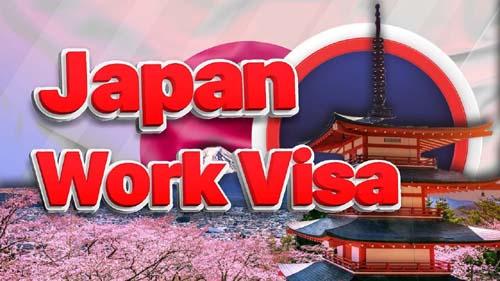
Japan work visa explained: Procedure, necessary documents, fee and processing time
Tokyo: The Ministry of Foreign Affairs of Japan offers a list of occupations that are eligible for Japanese Work Visas.
These include the following: Professor (Examples: university professor, assistant professor, assistant, etc.), Artist (Examples: composers, songwriters, artists, sculptors, craftspeople, photographers, etc.), Religious activities (Examples: People associated with religion such as monks, bishops, missionaries, etc.), Journalist (Examples: newspaper journalists, magazine journalists, editors, news cameramen, announcers, etc.), Business manager (Examples: company presidents, directors, etc.)
Legal/Accounting services (Examples: attorneys, judicial scriveners, public accountants, tax accountants, etc. certified in Japan), Medical services (Examples: physicians, dentists, pharmacists, nurses, etc. certified in Japan), Researcher (Examples: researchers, investigators, etc. at research institutes, etc.), Instructor (Examples: teachers, etc. at elementary schools, intermediate schools and high schools), Engineer/Specialist in humanities/International services (Examples: scientific engineers, IT engineers, foreign language teachers, interpreters, copywriters, designers, etc.), Intra-company transferee (Examples: people transferred to the Japanese branch (head office of the same company, etc.), Nursing care (Example: certified care giver) Entertainer (Examples: musicians, actors, singers, dancers, sportspeople, models, etc.), Skilled labor (Examples: chefs expert in the food of a foreign country, animal trainers, pilots, sports trainers, sommeliers, etc.), Specified skilled worker (Work-ready foreign nationals who possess certain expertise and skills in certain industrial fields) and Technical intern training (Examples: Technical intern).
There are basically two types of Work visas offered by the Japanese Government as under:
Standard Work Visa (Duration of stay could be 5 years, 3 years, 1 year, 4 or 3 months): Highly skilled professional visa (Duration of stay of the applicant could be 5 years with varying limit for spouse).
The Standard Work Visa is issued to those professionals who are elaborated above like employers, teachers, and artists. On the other hand, the Japan Highly Skilled Professional Visa is issued through a point-based system and offers a longer period of stay and is more advantageous than a regular Work Visa.
A Certificate of Eligibility, which is issued by a regional immigration authority under the jurisdiction of the Immigration Services Agency of Japan, certifies that the foreign national conforms to the conditions for landing in Japan (which means the activity stated in the application is true and it is one of the activities (except Temporary Visitor) stipulated in the Immigration Control Act).
Although the certificate of eligibility does not guarantee the issuance of visa, its presentation ensures that the visa application at the Embassy or Consulate-General and the examination at the passport control will be processed smoothly.
Foreign nationals who want to obtain the visa for highly skilled professionals have to get a Certificate of Eligibility with the notation of total points and type of activities as a highly skilled professional from a regional immigration bureau in Japan. Without the Certificate of Eligibility, the visa for highly skilled professionals cannot be applied.
The procedure for applying for Japan’s work visa is very simple. For instance in the first step you have to move to any embassy or consulate near your city and apply there with all the required documents.
The application is first examined by the embassy and if needed, additional documents are also sought. In some cases, the applicants are also called for an interview and so you should be ready for an in person interview as well.
After this process is completed, you can get a visa issued after which you have three months to travel to Japan. This process is for all those who are applying from outside Japan.
There are three ways to apply for a visa. The first case is the one in which the visa applicant him/herself goes directly to the Japanese Embassy / Consulate General while in the second case, the visa applicant writes a Letter of Proxy and get a proxy to go to the Japanese Embassy / Consulate General in his / her place, and lastly, the visa applicant can also use an accredited travel agent approved by the Japanese Embassy / Consulate General.
It must be kept in mind that Japan’s Ministry of Foreign Affairs says that depending on the circumstances in your country or region, there are cases that the documents should only be submitted by the applicant him/herself going to the Japanese Embassy/Consulate, or through an accredited travel agent.
Visa processing time: The Japan’s Ministry of Foreign Affairs has clarified that the standard processing period takes five working days from the next day after the date of the acceptance of application.
The ministry has also elaborated that the processing time may take longer than 5 days depending on the number of applicants.
If additional documents and interview are needed then it can also take moths for the embassy to get back to you.
Japanese Work Visa fee: For the issuance of visas, fees must be paid which are about 3,000 yen for a single-entry visa, 6,000 yen for a double-entry or multiple-entry visa, and 700 yen for a transit visa. Fees are collected in the currency of the country (region) in which the Embassy / Consulate General is located. Depending on the purpose of your visit and your nationality, fees may not be required or may be a different amount.
The Japan’s Ministry of Foreign Affairs has clarified that if the visa is not issued, no fees are required. The processing fees are needed in addition to the visa issuance fees in case the visa application is made through an approved agency by the Embassy / Consulate General of Japan.
